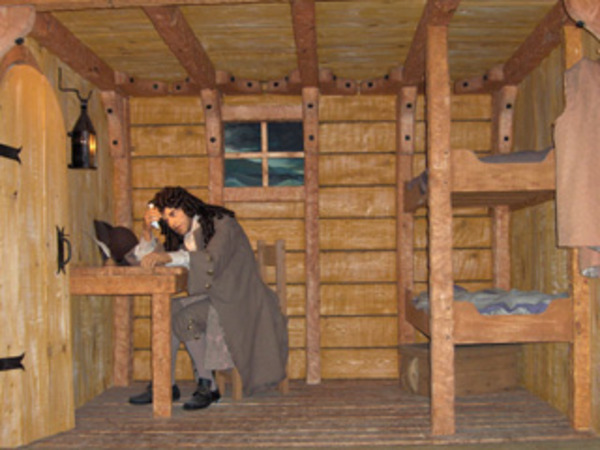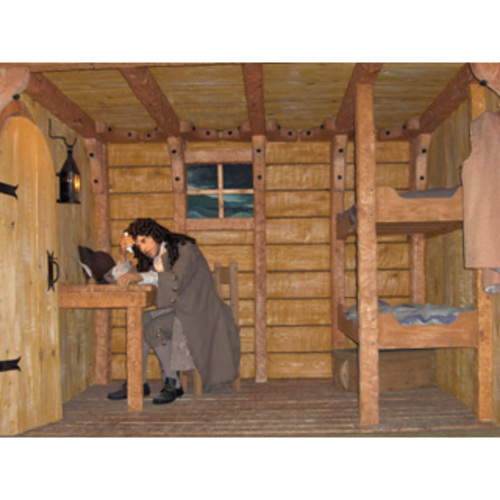
Source: Link
DIÈREVILLE (Dierville, Dière de Dièreville), French surgeon and writer, author of an account of a voyage to Acadia; b. in France, perhaps at Pont-l’Évêque (department of Calvados); fl. 1699–1711.
The name Dièreville is not unknown in Normandy. An act dated 26 Nov. 1625, concerning one Jehan Dièreville, of Saint-Thomas de Touques, has been found in the registry of the tabellions of Honfleur. Moreover, several Dières were at Honfleur at the beginning of the 17th century, among them Guyon and Jacques Dières, who were sea captains. Now Honfleur and Touques are not far from Pont-l’Évêque, where Dièreville is supposed to have been born.
The two forms, Dièreville and Dière de Dièreville, are found in documents existing at Pont-l’Évêque. Dierville, without initials or a first name, occurs in a report by a contemporary, Joseph Pitton de Tournefort, and on the labels of the Acadian plants (about 25 specimens) preserved in the herbarium of the Muséum d’Histoire Naturelle in Paris. These labels were written partly by Sébastien Vaillant, a botanist of the time. We do not know the first name of the person in question, and the initial N., first used in Father Le Jeune’s Dictionnaire, is not borne out by any known document. Nor do we know anything about the dates of his birth and death. The year 1670, sometimes mentioned as his birth-date, is only an approximation.
In 1698 Michel Bégon, intendant of La Rochelle, had a secretary named Pierre Dières. As this happens to be the Michel Bégon who had instructed Dièreville to write the account of his voyage to Acadia, and as the author dedicated it to him, it is legitimate to suppose that this Pierre Dières and Dière de Dièreville might be of the same family. According to a somewhat obscure note made by Delavaud and Dangibeaud, editors of Lettres de Michel Bégon, one of Pierre’s brothers, Jacques-Christophe, may have been commissary-general of the Marine for provisions at Saint-Jean-d’Angély. Now, as Michel Bégon was known for his rather pronounced nepotism, it is understandable that his solicitude should have extended equally to his secretary’s brothers. Moreover, we know from Dièreville’s account that he had three brothers, and, through the archives of Calvados, that he owned property near the village of Reux in the neighbourhood of Pont-l’Évêque. One may even wonder whether he was not born in that village rather than at Pont-l’Évêque. This is sometimes asserted, although without precise supporting documents.
Before 1699 Dièreville seems to have studied surgery at the Hôtel-Dieu in Paris, if we are to believe a passage in his account, and before 1701 he published some poems in the Mercure galant. But the principal event in his life was his journey to Acadia. On 20 Aug. 1699 he left La Rochelle on board the Royalle Paix, in the capacity of supercargo, that is, of an agent appointed by the shipowner and responsible for watching over the cargo. He reached Port-Royal (Annapolis Royal, N.S.) in Acadia on 13 October, after a voyage of 54 days. He spent a year in the country in search of information about the region and the French and Amerindian populations; he also gathered plants. On 6 Oct. 1700 he sailed for Europe, and reached La Rochelle on 9 November. On 21 December of the following year he became a surgeon at the hospice of Pont-l’Évêque, a post which he was still occupying on 10 April 1711.
Apart from that, nothing is known of him. Only his account and the plants he gathered in Acadia contribute to his fame. He brought back specimens of Chelone acadiensis (today Chelone glabra), which were types used by Tournefort when he described the species in 1706, and also the Diervilla acadiensis (today Diervilla Lonicera), a species of a genus which Tournefort dedicated to him. In his description Tournefort pays tribute to Dièreville as follows: “I know only one species of this genus, which M. Dierville, a surgeon of Pont-l’Évêque and very knowledgeable on the subject of plants, has brought from Acadia.”
Michel Bégon – to whom Plumier dedicated the genus Begonia, and whose son of the same name, Michel*, was to become intendant of New France – suggested to Dièreville that he write his account in verse, but the author’s friends did not approve of this. To please everybody, Dièreville sacrificed 5,000 lines of verse and kept only 2,529, the rimed stanzas alternating with prose. The result clearly demonstrates that Dièreville, in abandoning the lines, did not deprive the nation of any appreciable part of its poetic heritage!
The account bears the title of Relation du voyage du Port Royal de l’Acadie, ou de la Nouvelle France, and was published at Rouen in 1708. The author describes in detail the life aboard ship, not forgetting the cabin boy who was whipped to calm the wind and the loss overboard of part of the cargo. He shows a particular interest in fauna, and recounts his hunting and fishing trips, the fine drifting snow (which he calls foudrille) of the Canadian winter, the methods of making spruce beer and maple sugar; he describes the country of the aboiteaux (dikes), the customs of the Indians (and particularly their way of reviving drowned people by enemas of tobacco smoke), and the cooking of the Amerindians, the Acadians, and the seafarers. Culinary memories stimulate this gourmet, and the space that he allots to them makes of his account the first important work in the gastronomical literature of Canada.
The account, which was well received at the time, formed the subject of a long bibliographical study in the Journal des Scavans in 1708. It sold well, owing to the infatuation of a public that thirsted for exoticism. Boisard, wrongly, judged the publication severely. Others exaggerated its significance. The truth lies between the two extremes. The author has neither the accuracy, the acuteness of observation, nor the knowledge of the facts possessed by someone like Pierre Boucher. The work is doubtless rather superficial, but at a period when so much remained to be discovered in Canada, Dièreville does furnish some new information. Certain ethnological details are not to be found elsewhere. Moreover, reaching as he did the great mass of amateurs, he helped to create in the mother country a climate favourable to Acadia and to New France.
[There were three printings of Dièreville’s Relation in 1708. In the third, the editor added an account of an attack on Port-Royal by New England, taken from the Gazette of 25 Feb. 1708. In 1710, another edition – apparently unauthorized – appeared in Amsterdam, then an English translation in 1714, and an abridged German version in 1751. In 1885, L. U. Fontaine re-edited the work in Quebec, leaving out the spicy sections and the account of the return voyage. Finally in 1933, the Champlain Society of Toronto published a critical edition (with an English translation), prepared by Mr. and Mrs. Clarence Webster, and entitled: Relation of the voyage to Port Royal in Acadia or New France. j.r.]
Archives du Calvados (Caen), Tabellionnage de Honfleur, 26 nov. 1625. Documents relatifs à la marine normande et à ses armements aux XVIe et XVIIe siècles . . . , éd. Charles et Paul Bréard (Rouen, 1889). Journal des scavans (Paris), 1er série, 1708, 513–21. Lettres de Michel Bégon, éd. L. Delavaud et Charles Dangibeaud (3v., Archives historiques de la Saintonge et de l’Aunis, XLVII-XLIX, Paris, 1925–35), I, 35. [Joseph] Pitton de Tournefort, “Suite de l’établissement de quelques nouveaux genres de plantes,” Histoire de l’Académie royale des Sciences, 1706 (Paris, 1707), 83–87. Ferdinand Hoefer, Nouvelle biographie universelle[-générale] . . . (46v., Paris, 1852–66), XIV (1855). Frédéric Lachèvre, Bibliographie des recueils collectifs de poésies publiés de 1597 à 1700 (4v., Paris, 1901–5), III, 314. Le Jeune, Dictionnaire. L.-G. Michaud, Biographie universelle ancienne et moderne . . . (nouv. éd., 45v., Paris, 1854–65), XI. François Boisard, Notices biographiques, littéraires et critiques sur les hommes du Calvados qui se sont fait remarquer par leurs actions ou par leurs ouvrages (Caen, 1848). Marie-Victorin, Flore laurentienne (Montréal, 1935). Robert Le Blant, “Les études historiques sur la colonie française d’Acadie, 1603–1713,” Revue d’histoire des colonies (Paris), XXXV (1948), 104. Gérard Malchelosse, “La bibliothèque acadienne,” Cahiers des Dix, XIX (1954), 281.
Cite This Article
Jacques Rousseau, “DIÈREVILLE,” in Dictionary of Canadian Biography, vol. 2, University of Toronto/Université Laval, 2003–, accessed March 28, 2025, https://www.biographi.ca/en/bio/diereville_2E.html.
The citation above shows the format for footnotes and endnotes according to the Chicago manual of style (16th edition). Information to be used in other citation formats:
| Permalink: | https://www.biographi.ca/en/bio/diereville_2E.html |
| Author of Article: | Jacques Rousseau |
| Title of Article: | DIÈREVILLE |
| Publication Name: | Dictionary of Canadian Biography, vol. 2 |
| Publisher: | University of Toronto/Université Laval |
| Year of publication: | 1969 |
| Year of revision: | 1982 |
| Access Date: | March 28, 2025 |



